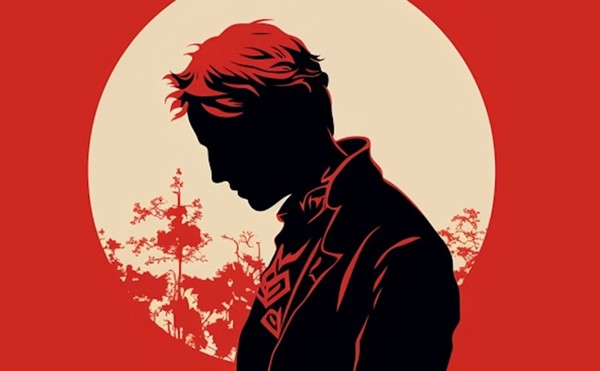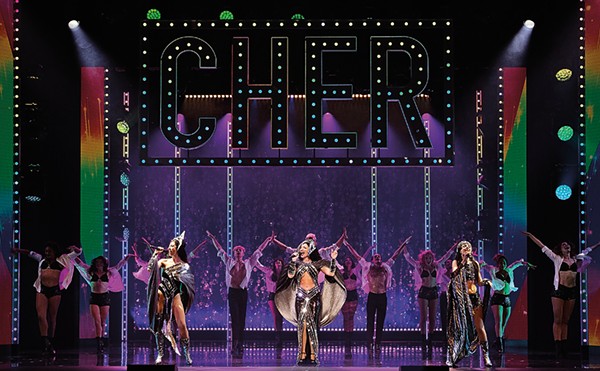How do you do that? Not very seriously. You treat Titus Andronicus as a cooking show; you deliver Othello as a rap song; you distill all sixteen comedies (many of which repeat the same plot devices anyway) into one all-inclusive farce. One of the show's three original creators described The Compleat Wks of Wllm Shkspr (Abridged) as "counterculture Shakespeare" with "a garage-band edge." Yet, like it or not, in the fifteen years since this daffy script was first developed, it has been embraced by the dreaded establishment. Initially the writers periodically updated the show in an effort to keep the humor topical. But I sense that the rewrites are behind them and that nowadays, local companies such as St. Louis Shakespeare are encouraged to play fast and loose in the cracks and crevices of the time-proven sketches.
Under what appears to be the stealthy, yet tightly controlled, direction of Donna Northcutt, the evening's three spry performers -- Mike Bowdern, Bradley Calise and Corey Jones -- scamper about Patrick Huber's whimsical stage set, racing through the plays and characters (especially the women; it's always a hoot to see a man in a dress, right?), looking for every off-color double-entendre in the canon. Many of their efforts are fun, and some are even funny. But sometimes they're merely frenetic.
It's during those occasional loud, arid stretches (Romeo and Juliet, for instance) that one has the opportunity to muse about what it is we're seeing onstage. Is the evening intended to be satire? I don't think so. Satire holds stupidity up to ridicule and contempt, but I doubt that anyone would dismiss the Bard as stupid. So perhaps the target here is not so much Shakespeare's 37 plays as it is the often stupid renderings of those plays. Has any author ever been the butt of more pompous, misguided, muddleheaded productions than the Bard of Avon? If any message is to be found amid all this contrived mayhem, perhaps it's the reminder that Will's plays always have, and ever will, suffer unimaginable indignities.
Or perhaps the message is simply this: There is no message, so laugh and have a good time (which the capacity opening-night audience did in abundance). Yet here's a curious irony: Shakespeare is eternal, but The Compleat Wks is surprisingly ephemeral.
Hamlet, which receives the lion's share of Act 2, is emblematic of The Compleat Wks at both its most inspired and most flawed. In lampooning Shakespeare's most popular tragedy ("There are more things in heaven and earth, Horatio, than are dreamt of in your philosophy -- so piss off"), the sketch is hilarious. But when it decides to turn Hamlet into an audience-participation Peter, Paul and Mary concert, the evening deflates faster than a punctured balloon. Eventually the three energetic performers get the show back on track. But by evening's end, that old maxim "less is more" has been ignored, with the result that -- rather than building to a climax -- the production tends to wear out its welcome.
It seems foolish, doesn't it, to complain that a show running less than two hours is too long. It's just that Shakespeare always had it right: Brevity is the soul of wit. Some judicious pruning could go a long way toward disguising the fact that at its core, the felicitous Compleat Wks of Wllm Shkspr (Abridged) is all sound and fury, signifying very little indeed.





